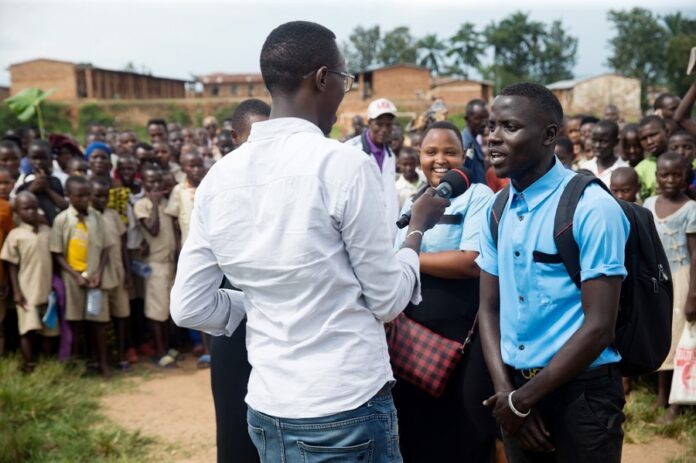Illustrative Image: Youth Inclusion in Peacebuilding in Nigeria: Challenges, Opportunities, and Policy Recommendations for Sustainable Development
Image Source & Credit: Interpeace
Ownership and Usage Policy
A recent study by Ibrahim, A. L., & Ibrahim, M. S. (2025) titled “The Prospects and Challenges of Youth Inclusion in Peace-Building for Sustainable Development in Nigeria” published in Dutse Journal of Peace and Conflict Resolution revealed that while there have been notable efforts to promote youth inclusion in peacebuilding in Nigeria, these efforts are hindered by several significant challenges.
“
Youth inclusion in peacebuilding is crucial for Nigeria’s stability but faces major political and socio-economic challenges.– Ibrahim, A. L., & Ibrahim, M. S. 2025
This study examines the role of young people in promoting peace and stability across the country. The authors highlights how Nigeria faces various conflicts—from insurgencies to communal clashes—that threaten its development. Given that youths make up a significant portion of the population, their engagement in peacebuilding is crucial. The study argues that while efforts have been made to involve youths in peace initiatives, several obstacles hinder their participation, including political exclusion, lack of funding, socio-economic challenges, and limited implementation of youth-focused peace frameworks. It emphasizes that deepening youth inclusion through peace education, capacity-building, and inclusive governance can significantly contribute to national stability.
How the Study was Conducted
The study adopted a qualitative research design, relying on secondary data sources such as journals, textbooks, reports, newspapers, and other internet materials. Instead of collecting new data through surveys or interviews, the researchers used content analysis to examine and interpret existing literature. This method allowed them to identify patterns, themes, and insights regarding youth inclusion in peacebuilding efforts in Nigeria. Additionally, the study was guided by structural-functional theory, which emphasizes how different societal components work together to maintain stability. The authors used this theoretical framework to explore how youth participation in peacebuilding contributes to national development and stability.
What the Authors Found
The study revealed that while there have been notable efforts to promote youth inclusion in peacebuilding in Nigeria, these efforts are hindered by several significant challenges. Key obstacles include political exclusion, marginalization, and inadequate funding, which collectively limit the ability of young people to participate effectively in peacebuilding initiatives. Socio-economic barriers, such as high unemployment rates, poverty, and limited access to education, further restrict youth engagement and contribution.
Despite the existence of supportive policies like the National Action Plan on Youth, Peace, and Security, the implementation of these frameworks remains inconsistent across various states, undermining their effectiveness. Nonetheless, the study highlights the vast potential of young people in fostering national stability and development. If empowered through peace education, leadership training, and inclusive governance, youths can become vital agents of change.
Why is this important
This study is important because youth inclusion in peacebuilding is essential for Nigeria’s stability and sustainable development. Given that young people make up a large percentage of the population, their engagement in peace initiatives can significantly reduce conflicts, strengthen social cohesion, and foster national progress.
Without active youth participation, the country risks ongoing violence, economic stagnation, and social disintegration. This study highlights both the potential and the challenges of youth involvement, offering solutions such as peace education, empowerment programs, and inclusive governance to harness their energy for positive change.
Additionally, the research underscores how global frameworks like United Nations Security Council Resolution 2250 and Nigeria’s National Action Plan on Youth, Peace, and Security support youth-led peace efforts. Implementing these policies effectively can curb violence, create jobs, and promote national unity, leading to a more stable future.
What the Authors Recommended
- The authors recommeds that the federal and state governments should empower young people by increasing their involvement in decision-making processes.
- The study emphasizes that governments should prioritize youth-related concerns as part of national and state development strategies, ensuring both short-term and long-term engagement.
- States should domesticate and effectively implement policies that support youth-led peace initiatives.
- Government agencies should enhance mechanisms for peacebuilding and conflict resolution, making them more accessible and effective for young people.
- Additionally, creating strong networks and platforms for mobilizing youth participation in peacebuilding can foster sustained engagement and impact.
In conclusion, the study by Ibrahim, A. L., & Ibrahim, M. S. underscores the vital role that Nigerian youth can play in achieving peace and sustainable development. While significant barriers such as political exclusion, inadequate funding, and socio-economic challenges persist, the potential of young people to drive positive change remains immense. By effectively implementing supportive policies, investing in peace education, and creating inclusive platforms for engagement, Nigeria can harness the energy, creativity, and resilience of its youth to build a more stable, united, and prosperous nation.
















 The African Research (AR) Index is a comprehensive scholarly directory and database focused explicitly on journal publishers that publish and disseminate African research.
The African Research (AR) Index is a comprehensive scholarly directory and database focused explicitly on journal publishers that publish and disseminate African research.

